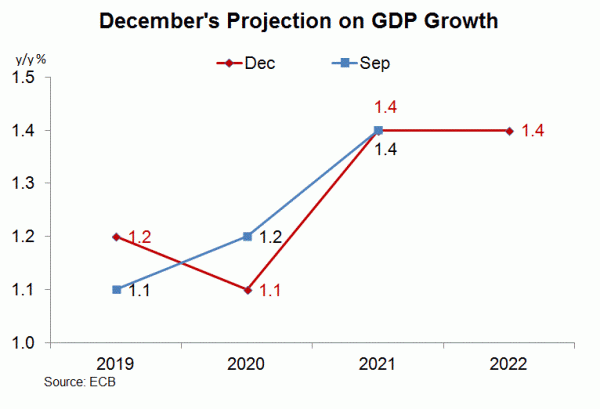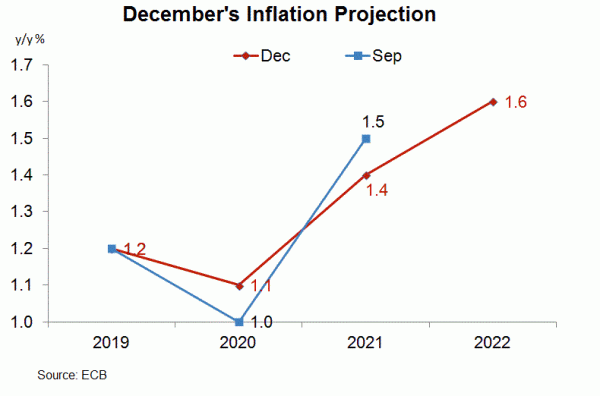At the first ECB led by Christine Lagarde, the members decided to leave the deposit rate unchanged at -0.5%. Meanwhile, the main refi rate and marginal lending rate also stay unchanged at 0% and 0.25%, respectively. The pace of the asset purchase program, effective on November 1, also stays at 20B euro per month. These have been widely anticipated as Lagarde is expected to carry on Mario Draghi’s legacy, given the latest stimulus measures were only announced in September.
The central bank appears more optimistic about the economic outlook, both domestically and globally. Lagarde noted that there are “some initial signs of stabilisation in the growth slowdown”, and “a mild increase” in inflation pressures. The changes in the updated economic projections are modest. On GDP, the staff has revised growth to +1.2% for this year, from September’s projection of +1.1%. GDP growth for 2020 is revised lower to +1.1%, from +1.2% estimated in September. Growth will then accelerate to +1.4% in 2021 and 2022. The members acknowledged that risks are skewed to the downside, though slightly less pronounced than previously. On inflation, headline CPI forecast is upgraded slightly to +1.2% (September: +1.1%) for this year, but the downgraded back to +1.1% (September: +1.2%) for 2020. Inflation is expected to accelerate to +1.4% and +1.6% in 2021 and 2022, respectively. On the global environment, Lagarde indicated that the “downside risks” of both trade war and Brexit are “diminishing”.
The forward statement on the monetary policy outlook is the same as the previous meeting. The committee expects the policy rates to “remain at their present or lower levels” until inflation improves to a level “close to, but below, 2%”. Meanwhile, the asset purchase program is expected to “run for as long as necessary to reinforce the accommodative impact of its policy rates, and to end shortly before it starts raising the key ECB interest rates”.
Similar to Draghi, Lagarde called for the government’s fiscal measures to stimulus the economy. As she suggested at the press conference, “Governments with fiscal space should be ready to act in an effective and timely manner. In countries where public debt is high, governments need to pursue prudent policies and meet structural balance targets”.
As ECB is adopting negative interest rates, with the Eurozone in low growth and inflation, some have associated it with Japan. When asked about Japanification of the Eurozone, Lagarde dismissed the possibility by noting that “there is a major difference between the credit market in Japan, and for Eurozone firms and consumers”.


